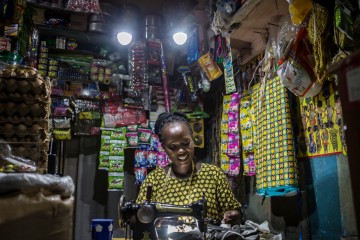- About
- Topics
- Picks
- Audio
- Story
- In-Depth
- Opinion
- News
- Donate
- Signup for our newsletterOur Editors' Best Picks.Send
Read, Debate: Engage.
| June 21, 2016 | |
|---|---|
| topic: | Energy |
| tags: | #African Union, #climate change, #renewable energy |
| located: | Nigeria |
| by: | Israel Bionyi |
“Renewable energy and climate change is important but we must prioritise development”, said H.E. Oluyemi Oluleke Osinbajo, Vice President of Nigeria on Tuesday May 24 at a high level panel for African leaders on Energy and Climate Change organised by AfDB.“Africa is the lowest contributor to greenhouse gas emissions, yet, Africa is the highest hit by all the consequences of climate change. That is the paradox. But that paradox becomes jeopardy when we are being asked to take a greater burden of resolving the problems of climate change”
“We need the base load power which is so difficult to get with solar energy. Even if the energy sources are not as clean as possible. We are going to go with what we have.”This position was backed by the statement of H.E. Idriss Deby, President of the Republic of Chad and Chairperson of the African Union present at the panel. “We know that Africa has resources but we need to have access to energy before knowing whether it is clean or not. They can’t stop us. Elsewhere [The West] they develop energy on nuclear, coal, etc. but in Africa they say it is not good”, he said.
Taking climate change for granted could be catastrophic for Africa
H.E. Mme Mary Therese Winifred Robinson, Former President of Ireland and head of the Mary Robinson Foundation for Climate Justice urged African leaders to use a powerful collective voice to secure a sustainable future.
Her advice to African leaders: “$100 million is far too small for you to demand. You need to change the mindsets of other leaders. Europe developed their countries through fossil fuel and are now slopping down. You need to have a collective voice to change. A solidarity of climate finance. You should use your collective voice and argue for climate justice.”
H.E. Mary Robinson also cautioned African leaders about the risks of taking climate change for granted. She was clear: “Africa has to prioritise development but presidents need to keep in mind Africa is going to suffer the most from climate change. If Africa continue to have only development you [leaders] might drive your countries to a catastrophe. The future is catastrophic unless we solve the problems of climate change”.
Investing in decentralized renewable energy could speed up access
The 2015 Africa Progress Report say, 700 million people don’t have access to clean cooking energy, and 600 000 Africans die every year due to polluted fuel. Dr Adesina Akinwumi, President of AfDB in his speech during the opening ceremony of the event said, Africa is simply tired of being in the dark. He plans to reach universal access to energy for Africa in the next 10 years.
The Bank will invest $12 billion each year in the next five years to “expand grid power by 160 Gigawatts. Connect 130 million persons to grid power. Connect 75 million persons to off-grid systems. And provide access to 150 million households to clean cooking energy”, he said.
A new report launched within the context of the meeting by Aaron Leopold, Deputy Director, Global Advocacy at Power for All, suggests decentralized renewable energy (DRE) systems are well placed to ‘speed up’ universal access to energy. The study capitalise on energy investment portfolios from Multilateral Development Banks (MDB) like; the Inter-American Development Bank, the Asian Development Bank, and the World Bank to showcase how much progress AfDB could realise adopting DRE.
Aaron’s argument is straightforward: “The opportunity costs of delaying energy access can be remedied if MDB and infrastructure development agencies incorporate into their plans the full spectrum of energy options available today, including DRE systems.”
By copying the embed code below, you agree to adhere to our republishing guidelines.
